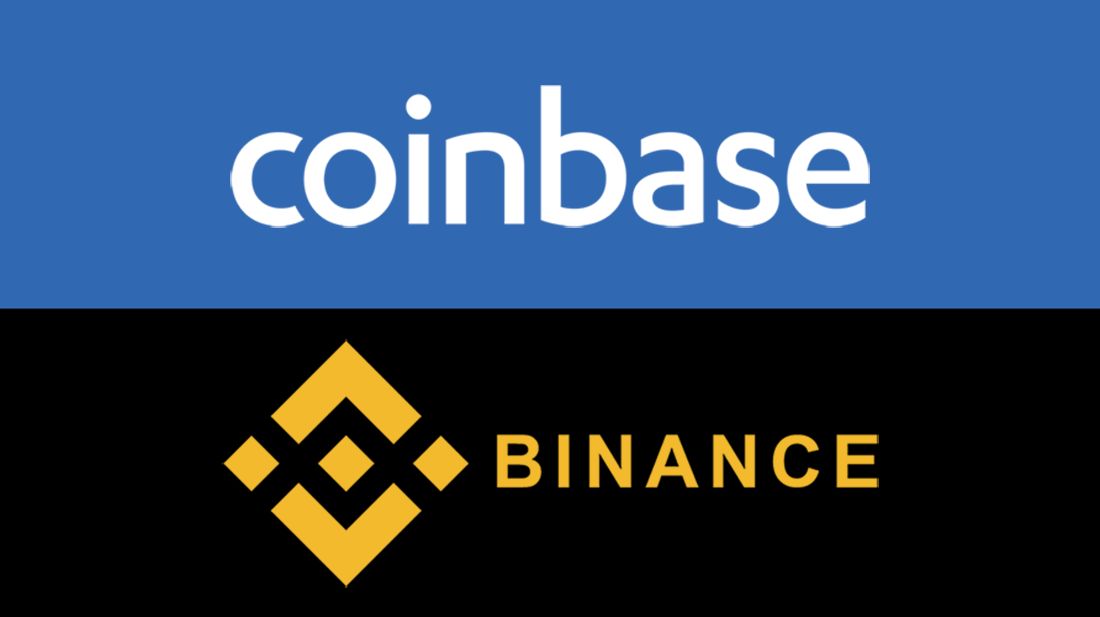Binance versus Coinbase: Essential insights for 2023
With this article, we’ll explore the differences between Coinbase and Binance so you can make an informed choice about which platform aligns with your trading needs.

Coinbase acts as a digital wallet for crypto enthusiasts, enabling users to easily buy and sell popular cryptocurrencies like Bitcoin, Ethereum, Litecoin, and Bitcoin Cash. Its popularity in the United States has made it a favored choice for American investors venturing into the world of digital assets.
On the other hand, Binance boasts a broader array of cryptocurrencies compared to Coinbase. However, it has a more limited reach regarding country availability. Binance offers trading in Bitcoin, Ethereum, Litecoin, Monero, and many appealing altcoins. Additionally, Binance enables participation in initial coin offerings (ICOs), providing a platform for companies to launch their cryptocurrencies while securing funding.

While both Coinbase and Binance are widely recognized and reputable exchanges, selecting the right one involves weighing various factors. For American traders seeking a user-friendly interface, Coinbase might be the ideal selection. Conversely, if a diverse range of coins and access to ICOs is what you're after, Binance could better suit your needs. Ultimately, the decision rests on your individual trading objectives.
Binance or Coinbase — which option fits your trading strategy better?
Both Binance and Coinbase are incredibly popular among millions globally, facilitating the buying and selling of digital currencies. But how do you know which platform is the right fit for you?
A significant difference between Binance and Coinbase lies in their respective targets. Binance is often favored by seasoned traders desiring extensive trading options and features, whereas Coinbase tends to attract novice users who are just starting their journey in the crypto space.
Another crucial factor is the diversity of cryptocurrencies they offer. Coinbase supports a more limited selection, while Binance features hundreds of different coins and tokens. Therefore, if you're looking to invest in rare altcoins or lesser-known cryptocurrencies, Binance may be more suitable for your investment strategy.
Regarding fees, Binance generally imposes lower trading costs than Coinbase. However, Coinbase is designed with a more intuitive user interface, making it easier for newcomers to navigate. Furthermore, Coinbase also supports various payment methods, including credit and debit cards, which Binance currently does not.
Ultimately, whether you choose Binance or Coinbase Ultimately, the best choice for you as a cryptocurrency trader depends on your specific needs and preferences. Consider factors such as your level of experience, trading style, and what you’re looking for in a trading platform. Both Binance and Coinbase are excellent options for anyone interested in entering the cryptocurrency market.
It's also essential to note that both Binance and Coinbase feature relatively high fees for their services. If minimizing costs is a priority for you, exploring alternative platforms may be worthwhile. As you weigh your options, remember to reflect on your unique goals and requirements as a cryptocurrency investor.
Binance history
Binance has emerged as one of the most recognized and widely used crypto trading platforms available today, but its history dates back well before its launch in 2017. The initial groundwork for Binance began in 2013, led by Changpeng Zhao and Yi He, supported by a strong development team.

During its formative years, Binance experienced significant growth, primarily by enabling its founders to trade Bitcoin amongst themselves to refine its trading software. By 2014, the platform had established enough traction to attract outside investors, garnering attention from the cryptocurrency community.
The official launch of Binance took place in 2017, marked by an initial coin offering (ICO) that successfully raised over $15 million. This funding enabled the establishment of their trading platform, which went live in July of the same year.
Since that launch, Binance has undergone tremendous expansion and has solidified its standing as a reliable and prominent exchange in the crypto industry.
The platform now boasts a vast selection of cryptocurrencies, offering trading pairs with BTC, ETH, Tether (USDT), as well as Binance’s own native token, BNB. Beyond trading, Binance provides various services, including a cryptocurrency wallet, a decentralized exchange known as Binance DEX, along with a blockchain investment fund.
In summary, Binance’s journey is one of advancement and achievement, positioning it as a major player in the cryptocurrency sector, with no signs of a slowdown in its development, opening the door for numerous investment opportunities.
Coinbase history
Coinbase, another leading player in the crypto trading landscape, started its journey in 2012, founded by Brian Armstrong and Fred Ehrsam. Similar to Binance, it began as a platform enabling users to buy and sell Bitcoin before evolving into a full-fledged exchange.
This initial success set the stage for rapid growth, and over the years, Coinbase saw an extraordinary surge in user sign-ups. By 2017, it had established itself firmly among the most popular crypto exchanges, boasting over 13 million registered accounts and support for over 30 cryptocurrencies.
Today, Coinbase remains a trusted name in the crypto realm, offering a rich array of products and services. This encompasses a marketplace, a digital wallet, educational resources, and even options for purchasing cryptocurrencies directly with fiat from bank accounts.
With its emphasis on user-friendliness, security, and overall reliability, Coinbase serves as an excellent platform for those looking to delve into the world of cryptocurrency trading. Whether you're just starting or are a seasoned trader, you can count on Coinbase to provide the necessary tools and resources.
How do Binance and Coinbase work?
Binance and Coinbase stand out as two of the leading exchanges globally, both of which pioneered trading not just for Bitcoin but also for a wide array of cryptocurrencies, including Ethereum, Ripple (XRP), Litecoin, IOTA, and more. They play a critical role in the market and are often used to acquire new coins during their ICOs, in addition to providing wallet services and various payment methods for crypto purchases.
Founded by Changpeng Zhao, a Chinese entrepreneur who relocated to Hong Kong for better business opportunities, Binance came into being in July 2017 and quickly grew to become one of the top exchanges worldwide. Its multilingual support includes English, Chinese, Russian, Japanese, and Korean, catering to a global audience while offering high-volume trading and competitive transaction fees.
Coinbase was established in 2012 by Brian Armstrong and Fred Ehrsam, who initially met at Airbnb. This exchange was launched merely months after Binance and, like its counterpart, rapidly developed into a significant player in the marketplace. The platform has since received several rounds of venture capital investment, allowing it to expand into 32 countries. Initially focused on Bitcoin trading, Coinbase has since broadened its offerings to include Ethereum, Litecoin, and Bitcoin Cash.
Despite their similarities, notable differences exist between these two platforms. Coinbase supports a narrower range of cryptocurrencies compared to Binance’s expansive network of over a hundred coins. Additionally, Coinbase typically incurs higher fees and maintains stricter user verification processes. Nevertheless, Coinbase provides a trusted wallet service utilized by millions, while Binance focuses on accommodating high-volume traders with lower transaction costs.
In conclusion, Binance and Coinbase are pivotal entities in the cryptocurrency arena. Their contributions have significantly influenced the growth of the crypto industry, and they continue to innovate and enhance their platforms, catering to traders around the world. Unless major changes occur in the market, it's likely that these exchanges will remain integral players in the ever-evolving landscape of cryptocurrencies for many years ahead.
As you can see, there is a multitude of advantages and features associated with both Binance and Coinbase. Whether you're interested in participating in an ICO or simply wish to trade on a high-volume platform with lower fees, these exchanges are designed to simplify your experience and help you achieve success.
Binance vs. Coinbase: Features
Binance vs. Coinbase: Essential Insights for 2023
Coinbase provides a digital platform for users to perform cryptocurrency transactions. Binance is another widely recognized exchange, but there are some key distinctions between the two.
Coinbase serves as a digital currency exchange facilitating various transactions. Binance is also a notable platform, yet it presents several significant differences worth considering.
FTC's Attempt to Block Microsoft-Activision Merger Fails
Which one is the best for you in 2023?
To enhance your experience in your local language, we may occasionally use an auto-translation plugin. Please understand that this may not always be accurate, so it’s advisable to read carefully.
In this comparison, we delve into the characteristics of Coinbase and Binance, empowering you to determine which platform aligns with your needs, as both platforms cater differently to users.
Binance vs. Coinbase: Which exchange should be your pick?
FAQs
As a wallet service for digital currency users, Coinbase provides options for buying and selling various cryptocurrencies such as Bitcoin, Ethereum, Litecoin, and Bitcoin Cash. Its popularity in the U.S. makes it a primary choice for many American investors.
Binance boasts a broader range of cryptocurrencies compared to Coinbase, although its availability is limited in certain countries. It allows for trading a variety of popular altcoins including Bitcoin, Ethereum, Litecoin, and Monero. Moreover, Binance opens doors to initial coin offerings (ICOs), providing startups a platform to raise capital through cryptocurrency sales.
While both Coinbase and Binance are reputable exchanges, there are several trade-offs to consider based on your preferences. If you’re an American investor looking for a dependable and user-friendly service, Coinbase might suit you better. If, however, your interest lies in accessing a diverse array of coins and ICOs, Binance could be the preferable choice. Ultimately, your decision should reflect your personal trading needs.
Both Binance and Coinbase have captured the attention of millions globally as leading platforms for trading digital currencies. But which one fits your trading style?
Conclusion
One significant difference lies in the demographic each platform attracts. Binance is favored by seasoned traders seeking extensive features and trading options, while Coinbase is the go-to for newcomers just venturing into the world of cryptocurrencies.
Related articles :
- Another vital difference is the range of digital assets available on each platform. Coinbase offers only a limited selection of coins, while Binance hosts hundreds of tokens. Thus, if you’re interested in investing in rare altcoins or lesser-known cryptocurrencies, Binance is likely your best bet.
- When it comes to trading fees, Binance has the edge with lower costs compared to Coinbase. Conversely, Coinbase features a more intuitive interface that is generally easier for beginners to navigate. Additionally, Coinbase provides multiple payment methods, including credit and debit cards, which Binance doesn’t currently support.
- Choosing between these two platforms largely depends on your personal trading dynamics and requirements as a crypto trader. To pick the right exchange for you, assessing your trading experience, style, and priorities is essential. Both exchanges stand out as commendable options for individuals looking to invest in digital currencies.
Disclaimer
In line with the Trust Project guidelines It’s also worth noting that both Binance and Coinbase impose comparatively high fees for their services. If you’re focused on minimizing costs associated with cryptocurrency trading, exploring alternative platforms could be worthwhile. In the end, weighing your unique goals and needs as a cryptocurrency trader is key when deciding between Binance and Coinbase.







